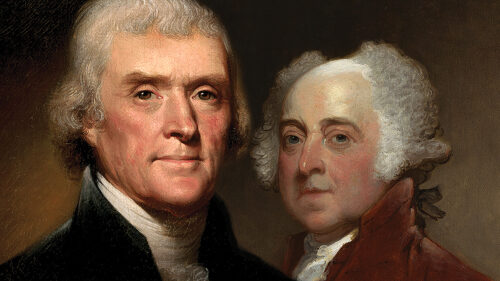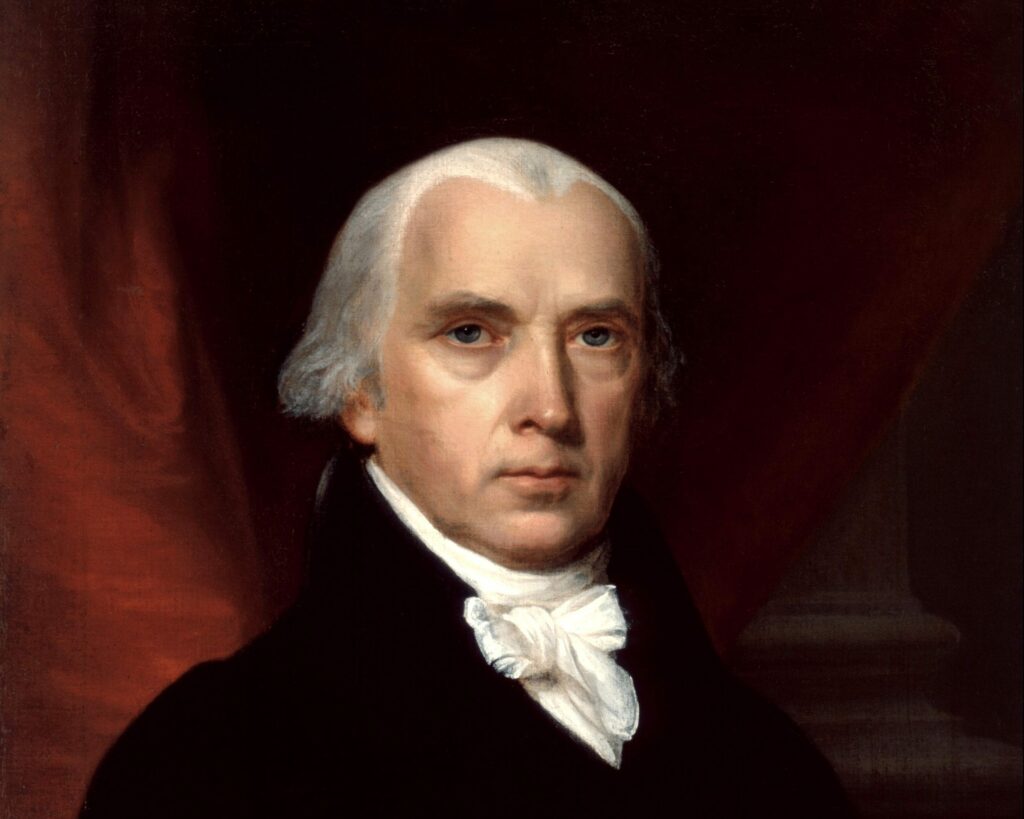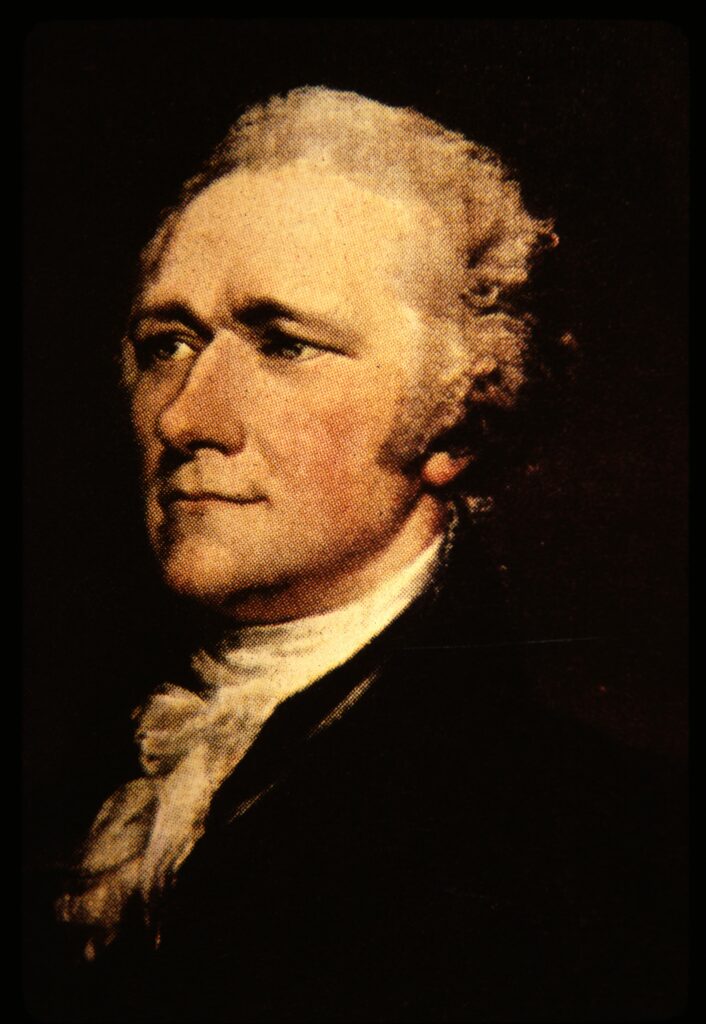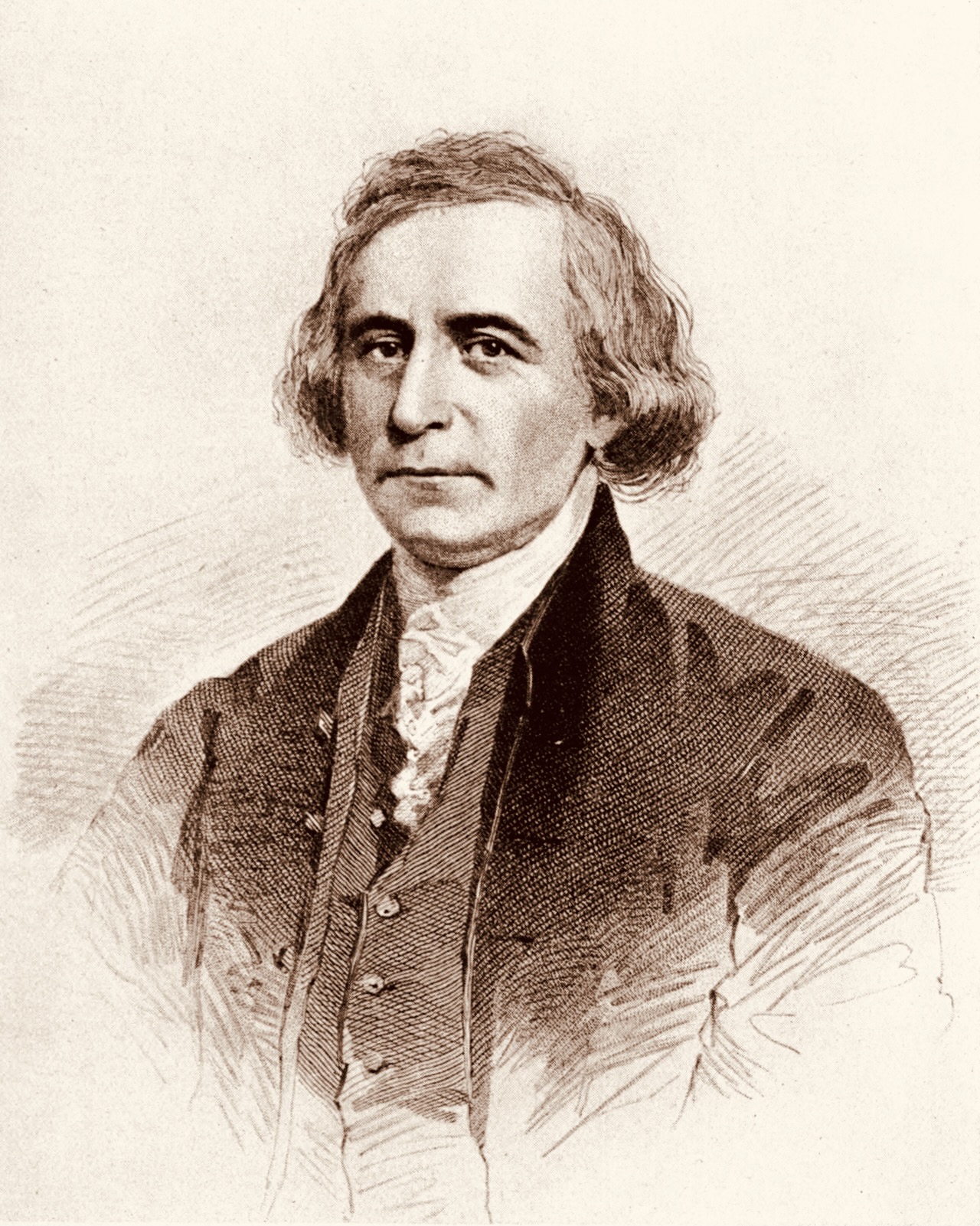
From Bullets to Ballots: The Election of 1800 - Ch. 5
The Republicans Organize

In 1791, Madison, Jefferson, and other soon-to-be leaders of the Republican party began to be much more disturbed about the direction of the government’s domestic policy under Hamilton’s influence. They seemed to be losing every conflict, to be “giving” much more than “taking.” Hamilton’s sweeping initiatives in public finance seemed to carry every aspect of policy in their train. The interdependence of domestic and foreign policy, which Hamilton’s project was intensifying, meant that Hamilton as the principal domestic policy official and Jefferson as the principal foreign policy official had a choice. They either had to share many views, which they increasingly did not, or one had to let the other have his own way, which neither was prepared to do.
In practice, it was Hamilton who was getting his own way, and Jefferson and Madison were losing. They had tried several times, and in 1791 continued to try, to get congress to adopt some version of their long-treasured plan to cut Americans loose from their commercial dependency on Britain, but the more conciliatory approach to Britain that was favored by Hamilton was always preferred by congress. It is not clear when they first perceived Hamilton’s new non-confrontational attitude to Britain, nor when they first saw the inseparability of Hamilton’s financial policies from his new attitude, but when they did make this connection they must have been very worried by the rapid progress of Hamilton’s projects, and by their new realization that it was those projects that had been blocking and would continue to block their own policy agenda with regard to Britain.
In 1790, Hamilton had got his funding bill through with no provision for discriminating between original holders and speculators in the national debt. Also approved was his scheme for the federal government to take over the states’ debts. To make things worse, from Jefferson’s perspective, Hamilton had duped him into helping with this last item: in 1790 assumption had been accepted by Jefferson as a necessary way of calming disunionist sentiments that had been emerging in states with heavy war debt burdens, but by 1792 Jefferson would avow that his part in the deal was a horrible mistake, since it turned out to be mainly a way of increasing the national debt in order to increase the money available for speculation and corruption.
In 1791, Congress approved (without much opposition) Hamilton’s proposal for new excise taxes on whisky that were needed for funding the national debt. The next stage of his public finance system was the plan for a national bank (with a significant capital, $10 million). This was discussed and quickly approved by the House of Representatives (by a vote of 39 to 20). The national bank was designed to facilitate federal tax collections and payment transactions, and to provide credit and currency for business investments and developments. Among the objections to this element of Hamilton’s project was the fact that this bank was to be permanently located in Philadelphia. Since Philadelphia was also the temporary political capital (until the District of Columbia had been laid out sufficiently by 1800), the establishment of a national bank there, with a charter for twenty years, might provide an argument for repealing the legislation to move the capital to the Potomac, with a view to maintaining the convenience of having the bank and government offices in the same city. (There was some talk of reducing the bank’s charter to ten years, to make its renewal—or nonrenewal—coincide with the government’s southward move, but this talk went nowhere.)
When the bank bill was debated in the House of Representatives, there were some hot protestations from a few members about the intrinsic evils of banking and monopolies, but Madison’s objections were cool and rational. He did not challenge the purposes of the bank, although he did raise some doubts about whether it would efficiently serve some of those purposes. His main objection was on grounds of the bank’s constitutionality: it was dangerous, said Madison, to read the Constitution’s grant of powers to congress as anything but limited to those powers specifically mentioned, and there was no mention of the power to charter a national bank. There was an air of bewilderment in some representatives’ responses to Madison’s argument. How could Madison be making such an argument? He was one of the principal architects of the Constitution—and, it could be added, one of the two main authors of The Federalist, where there were clear arguments (most, as we now know, written by none other than Madison himself) against such a narrow way of construing the Constitution, arguments that were now quoted (although they were then thought to be Hamilton’s) by Madison’s congressional opponents. These opponents also pointed out that Madison had interpreted the Constitution’s grants of power more liberally in previous congressional debates.

Was there not, then, some other, truer reason for Madison’s opposition to the bank? Madison was clearly frustrated at Hamilton’s long run of getting his own way. Perhaps the legalistic arguments about constitutional construction that Madison was making here—and that Jefferson and Attorney General Edmund Randolph would elaborate when Washington asked his cabinet for opinions on whether he should veto the bank bill—were a kind of holding operation, intended to see how much Hamilton could be opposed without these politicians actually having yet done enough in the way of organizing allies and preparing a sufficiently formidable opposition party to stop him. Washington signed the bank bill into law in February 1791, having considered and rejected the legalistic arguments of Madison, Jefferson and Randolph. From that month on through the remainder of 1791, we will see Madison and Jefferson taking steps to make up for lost time in organizing and in preparing the rhetoric for a broader and more effective political opposition to Hamilton’s policies.
This suggests that their true objection to Hamilton’s bank—or, more generally and more precisely, to the whole Hamiltonian financial and industrial project as it was now revealing itself—was that it consisted of innovations that were so important that their legitimacy demanded more than the majorities of the current congress (and signatures of the current president, as they would soon add). It could not be finally legitimized by congresses or presidents elected without any reference to it. It required a kind of popular referendum. In other words (since there is no provision for such a referendum in the Constitution), it required popular approval—or, as they were sure the case would be, disapproval—through elections fought on the basis of these policies. This is the reasoning that both Jefferson and Madison would use to justify their own deviations from the strict constitutional construction rules during their presidencies from 1801 to 1817. The most germane example is President Madison’s justification of his approval of the renewal of the national bank’s charter in 1816 by citing evidence of the “concurrence of the general will of the nation” in legislative, executive, and judicial recognitions of the bank’s constitutionality.
Thus the appeal to strict constitutional construction was in one sense a desperate measure by losers trying to stop their losses (if that’s the kind of thing that congress is going to go on doing, we’d better establish narrow limits to its powers!); in another sense, it was a holding operation (these are important issues; just wait a minute while we get ourselves organized so we can see what people think about it, please!); and finally, in its most confident and original sense, it was an insistence that there be reliable signs of public approval of major legislative programs (in the future, wouldn’t we representatives be better off with a clear public understanding about what policies we can assume the people are in favor of?). This last sense was a significant addition to American republican thinking. And Americans were beginning to learn that this insistence on signs of public approval can be operationalized most readily by party government, in which both voters and representatives have ties to a political party that bind them to that parties’ principles and policies. But how could such principled partisanship not result in bloody conflict with a persecuting resolution, as all such partisanship had previously done, in every historical instance without exception? This was the question they had to answer first.
Principled Partisanship as a Temporary Last Resort
In February 1791 Jefferson started writing letters to political leaders across the country, sounding out their reactions to the government’s policies, and suggesting that some of the people’s representatives in congress had been claiming falsely that their constituents were “well contented with the proceedings of the government.” To George Mason (a respected Virginia politician who had opposed ratification of the Constitution), whom he had written the previous June, apropos the assumption bill, that soothing line about it being necessary “to give as well as to take in a government like ours,” he now wrote, with regard to the excise and the bank bills (which he said would certainly become law): “Whether these measures be right or wrong abstractedly, more attention should be paid to the general opinion.” He remarked to another of this batch of correspondents: “Governments being founded on opinion, the opinion of the public, even when it is wrong, ought to respected to a certain degree.”
Jefferson indicated that he was by now in agreement with Madison that the Hamiltonian measures were wrong, being (as he wrote to Mason) too favourable to “the stock-jobbers.” But evidently his concern is also with the fact that public opinion had not been consulted. If it had been, he suggests, Hamilton’s program would not have been enacted. The implication is that since that program has been enacted, there is now nothing for it but to go public with what is actually a Federalist schism between Hamiltonian Federalists and a Republican party. Jefferson was not saying that public opinion is always right or even that it is always to be followed. As we shall see, in 1798, when Jefferson and Madison had been pushed to the more desperate tactic of using southern state legislatures as their primary means of putting out their party’s message, they would not be so sanguine about the results of elections based on the issues. But that was after American domestic politics had been badly skewed by the intense public attention to foreign policy, when a military and ideological war between Britain and France was virtually determining the course of American politics. In 1791 Jefferson was simply implying that in republics, public approval should at least be a starting point for important legislative programs. The people might not get it right, but they cannot get it right if they are not even asked!

At the end of February 1791 Jefferson offered Philip Freneau a government job that left him enough spare time to publish a newspaper. Freneau, a former classmate of Madison’s at Princeton, was a wandering poet and journalist. In politics he had been Anti-federalist, and he was extremely Anglophobic and highly critical of the fact that speculative profits were being made from the funding of the national and state debts. When Jefferson and Madison finally persuaded him to move from New York to Philadelphia, he set up as editor of the National Gazette, which soon after its first publication became known as the regular Republican newspaper in the city, for which Republicans—including Madison, but never Jefferson—would write pieces about public affairs, usually under pen names. Federalist writers would frequently contribute to John Fenno’s Gazette of the United States, which had been set up in 1789 as a relatively calm forum for presenting favorable views of the government. A newspaper war in the capital was part of the partisan campaign of 1792. Articles from these papers were regularly reprinted in other towns and states.
In May 1791 Jefferson and Madison set off on a month’s tour of New York and New England. This was a genuine vacation trip—they fished and botanized—but in New York they met certain political notables who were soon to become important in the Republican party. Among these were Robert Livingston (still smarting because his request for a cabinet office had been ignored by Washington) and the former Anti-federalist Aaron Burr (who had recently begun his own feud with Hamilton by beating Hamilton’s father-in-law out of one of New York’s Senate seats). An entente between Virginia and New York was to be one of the mainstays of the Republican party. A friend of Hamilton’s reported to him (however accurately) that Livingston, Burr, Jefferson and Madison were showing signs of “a passionate courtship” and that they all saw Hamilton as their common enemy.
The creation of the Republican party was preceded by an attempt to stop Hamilton by other means. At first the Republicans-to-be hoped that the reapportionment of congressional seats following the census of 1790 would produce a majority against Hamilton’s policies, but this did not happen. Then they tried to challenge the constitutionality of some of the policies (most famously, the national bank, but tax laws were also later challenged on this ground). Soon after the first public party campaign had begun (in 1792), the Senate received proposals for constitutional amendments to prohibit congress from granting monopoly charters (such as for national banks), and to prohibit any directors or managers of any bank or financial corporation from being eligible for election to the House or Senate. More promisingly, Jefferson tried talking and then writing to Washington to persuade him that his confidence in Hamilton and his policies was misplaced, and that there was reason to think that American republicanism was under threat. But in the end these future party leaders decided to create the weapon of principled popular partisanship. They organized that party, assembled its persuasion (its “profession of political faith”), and then deployed this sometimes blunt but extraordinarily powerful tool in the elections of 1792 and subsequently. They then reached out to some of the Antifederalists that they had been keeping their distance from, but they made Anti-federalists and their ideas part of the more optimistic, more nationalist, more focused and much better organized Republican party.
What would have happened if the Republicans-to-be had won their point without having to resort to principled partisanship? What if, for example, reapportionment had been sufficient, or they had succeeded in persuading Washington to ease Hamilton out of office and to replace him with someone more acceptable? Perhaps in this hypothetical alternative history, there would have been less bitter open political conflict in the remainder of this decade. If so, then the principle of the peaceful transition of power after deeply divisive popular elections would not have been established at this time.
But the less hypothetical question is: Why did they hesitate to use the powerful weapon of principled popular partisanship? They appear to have tried everything but this. Why did they hesitate to play the “country ideology” card—in the manner that they were soon to do, blending the Anti-federalist “country ideology” mantras with their own optimism and nationalism? Why not start with this move, instead of spending so much time and effort on the other tactics?
One answer to this question is that they did not actually hesitate, or at least did not hesitate very long. It was not before the beginning of 1791 that Jefferson and Madison concluded that Hamilton (who had just unveiled stage two of his project, the bank) must be stopped, if necessary by going public. By then it was of course too late to do anything about the 1790 elections (though—as throughout the decade—a few elections took place in the spring following the main election year). To have an effect on the elections of 1792, they had time to do some organizing—which as we have just seen is precisely what they immediately set about doing. We can imagine: they did not want to rant impotently as some Anti-federalists were doing, they wanted to win. But they wanted to create as little havoc as possible. They wanted a quickly won campaign, not a long total war. It was not as if they had to win the presidency, even if they felt they could. All they had to do was shift the balance of power in congress (in the House, by perhaps 10 seats: a large proportion, but not a large number). Even less than that might do; possibly unseating only a few would encourage the others to start paying more attention to their constituents’ opinions.
Another, related, answer to this question is that in their experience, principled partisan combat was best kept for a last resort, as well as a temporary one, after a “long train of abuses” has shown that such partisanship is necessary in order to put an end to threats to liberty. As we have seen, their most recent precedent for such combat was not the constitutional ratification contest, a relatively tame and limited affair, but the ideological conflict between patriots and loyalists in the American Revolution, which had ended well but—like other principled partisan battles in previous historical experience—had cost many lives and fortunes, and had left behind many bitter legacies as well as some fine achievements.
So their hesitation in starting a principled partisan conflict was understandable, not a sign of cowardice or of not knowing what they were about, but precisely the opposite, a sign of their knowledge of and previous experience with principled partisanship. It was a known but very dangerous path, and anyone taking this path needed to measure their forces. They had become confident that partisan action was justified. They had to say with James Monroe, the young Virginia Republican (who was to become president after Jefferson and Madison), that “to be passive in a controversy of this kind is a satisfactory proof that [one] is on the wrong side.” But Madison and Jefferson also knew that the consequences of their actions could be very serious indeed, both for themselves and for their opponents. It was all very well for Anti-federalists, like comfortable but politically marginalized country ideologists in England, to chatter in their somewhat paranoid fashion about the dreadful pass that the federal government was getting us into. But for a leading congressman like James Madison (actually the leading congressman) or a cabinet officer like Secretary of State Thomas Jefferson (in a cabinet of only four men) to raise questions about the republican character of the central policies of another cabinet officer, was bound to have more serious consequences. If nothing else, they would have to put up or shut up. As Jefferson clearly realized: in June 1792, while waiting for Washington’s invitation to see him to discuss a letter that Jefferson had written to him asserting that Hamilton’s policies had been enacted only because of the corruption of several congressmen, Jefferson asked Madison for a list of names, so that in case “the P. asks me for a list of particulars, I may enumerate names to him, without naming my authority, and show him that I had not been speaking merely at random.”
